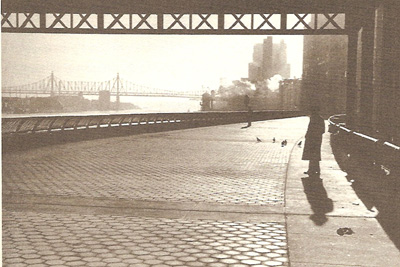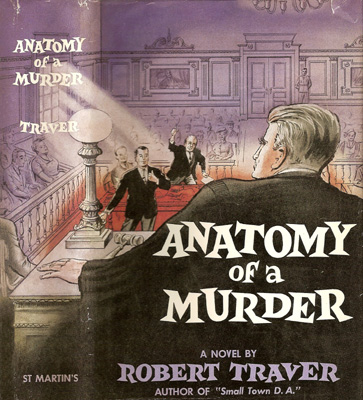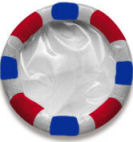In which we have a look at this week's
New York Times Book Review.
Fiction & Poetry
Perhaps I ought to point out, every so often, that there are
three areas of Book Review coverage that I don't follow: Crime, Science
Fiction, and Children's Books.
There, that's out of the way. Now for something truly
surprising: a bad review for Nadine Gordimer! Get A Life, reviewed by
Sophie Harrison, doesn't sound very inviting. A man afflicted with a variety of
thyroid cancer that Ms Harrison assures us is not as deadly as the
novelist thinks it is - take that! - a man with cancer goes off to live with his
parents so that his wife and son will not be exposed to his radioactivity.
Odious comparisons with The Magic Mountain are invited. "Sickness may be
a universal human affliction," Ms Harrison writes, "but that doesn't mean each
person's experience of it isn't unique. This novel forgets that. I've always
felt bullied by Ms Gordimer whenever I've tried out one of her stories in The
New Yorker, and I'm not a fan.
Nadine Gordimer, however, is a celebrated writer. First-time
novelist Jennifer Vandever is not, and I wonder why reviewer Chelsea Cain was
given two-thirds of a page to enumerate the faults of The Brontë Project: A
Novel of Passion, Desire, and Good PR. I'd like to stop right there, with
the PR crack, but the review itself has a great line. Sara Frost is a Charlotte Brontë scholar in search of a lost
letter that will make or break her dissertation. I have learned to dislike this
sort of book, of which the following sentence, mutatis mutandis, always
seems apt:
There are quotes from Brontë's letters, some biographical trivia,
a bit of gossip about an unrequited love - but Sara's devotion to Brontë's
work is never entirely believable.
That's
because it's literary appliqué, meretriciously tarting up a routine bit of
chick-lit. Another tell-tale sign: the bad girl, Claire, is the sparkling
character at the center of the satire that Ms Vandever ought to have written.
The symposium at which Claire quotes Yeats, Versace and Donald
Trump, all in relation to Princess Diana [her subject], highlights not only
Claire's ridiculousness but the inherent perils of taking pop culture
seriously at all.
Dawn Drzal's review of
Cooking With Fernet Branca, by James Hamilton-Paterson, set off a
surprisingly intense siren wail, the one that signals backfiring humor, than
which few literary mishaps are more unpleasant. "When going out to dinner with
someone you would be relieved to learn had died during the course of the day,"
runs the note to one of the facetious recipes that stud this novel about one of
those Englishmen who dislikes just about everybody. Once upon a time, I found
this sort of thing hugely funny. I don't know what happened, but it certainly
happened. Now, when I read that note, I'm simply relieved that I'm not likely to
have dinner with anyone whom I'd prefer to be dead.
Former counterterrorism official Richard A Clarke has penned a
thriller, Scorpion's Gate, that would probably start up a gale of
constructive questioning by the people who ought to read it, were they to read
it. According to thriller-writer Joseph Finder's review,
The Scorpion's Gate is unlikely to alter American foreign
policy and as a thriller it's not going to set anyone's hair on fire. But
its geopolitical arguments are no doubt as plausible as any you might find
in the President's Daily Brief. Probably more so. After all, whatever his
enemies in the Bush administration may say, Clarke's talent really isn't for
fiction.
Nice touch, that. Helen Shulman's
review of Music Through the Floor: Stories, by Eric Puchner, is a rave.
Mr Puchner's tales, she writes,
are told in a classical mode - not groundbreaking in terms of
form or content (misfits forced to swim against life's current), but
executed with such fluency, constructed with such surprising plot twists and
blessed with so many bright, memorable lines that they rise above the
contemporary din.
The problem was, I came
to Ms Shulman's judgment. She writes with more enthusiasm than appreciation.
David Kirby's similarly favorable review of Kay Ryan's new book of poems, The
Niagara River, seems more reliable on that score. He places her verse in the
tradition of Emily Dickinson and notes that she "cautions us against our
strengths rather than our frailties."
Nonfiction
I'm tempted to ignore Hugo Lindgren's review of two new books
about video games on the theory that they're science fiction, but that, of
course, is exactly what they're not. Imagine how pleased I was to read the
editorial suggestion that they "may show us where the whole world is heading."
Edward Castranova, author of Synthetic Worlds: The Business and Culture of
Online Games, is "bullish," Mr Lindgren writes.
Life in these alternative zones may eventually become so
fulfilling, he contends, "that a fairly substantial exodus may loom in the
distance." He means this, really. Like the Irish and Italians who left their
native lands in the late 19th century to come to America, gamers could
create a genuine human migration, away from the real and into the virtual.
What will be real then?
Heather Chaplin and
Aaron Ruby, the authors of Smartboard: The Quest for Art, Entertainment and
Big bucks in the Videogame Revolution, are apparently more realistic. They
write about an obsessive gamer who frequently loses his jobs and has to move
back in with his mother. This is one pastime that I'm grateful I was simply too
old for. (Full disclosure: I play FreeCell during interruptions, and I'll play
the same hand until I've played every card ("won"), but I have never actually
sat down at the computer to play it.)
There are two books about science. One, A People's History
of Science: Miners, Midwives, and "Low Mechanicks," by Clifford D
Conner, is doomed from the start. I didn't need Jonathan Wiener's review to
underline the sad truth about so many of the discoveries that contributed to our
comfort and convenience: they were made anonymously and not recorded. There are
a few gadgets - zippers, for example - whose invention can be traced, but most
cannot, and some discoveries, such as that of bronze, probably required
"generations of experimenters." While speculating about such matters, Mr Conner
is huffy about Great Men - the Newtons and Einsteins who discovered universal
laws of little everyday application. At least our scientific endeavor forms a
continuum from theory to practice; in the middle ages, engineers built
cathedrals without any input from academics. Mr Clifford is guilty of grudging
wishful thinking. Chris Mooney's The Republican War on Science, in
contrast, is quite level-headed, even if reviewer John Horgan calls his book a
"diatribe, from start to finish." There is simply no question that Republicans
have been intervening in what used to be non-partisan projects in order to free
enterprise from restriction on the one hand and to pacify religious
conservatives on the other. The former is by far the more damaging, because it
invariably involves environmental degradation. You would expect a patriarchy to
take its stewardship responsibilities seriously, but the one currently running
the United States couldn't care less about what human beings will have to cope
with fifty years from now. Or perhaps they really do believe their own
misstatements and adulterations of language. The Republican War on Science
is essential reading for anyone who has just begun to have doubts about the
Bush Administration.
In Come Back to Afghanistan, Said Hyder Akbar, a
teenager from California, writes, with help from Susan Burton, an editor at
"This American Life," about a recent sojourn in his ancestral homeland. His
father, Said Fazel Akbar, returned to Afghanistan at the request of his old
friend, Hamid Karzai, who appointed him governor of Kunar. His son spent summers
with him, and, at the urging of Ms Burton, he kept the audio diary that is the
basis of this book. I doubt that there will be many surprises for readers of
The Kite Runner, but Mr Akbar does appear to have developed a critical view
of the American military presence, which, as usual, is poor at effective
communication with the locals. (All I have to do is imagine Manhattan's
occupation by troops of undereducated Appalachians, and I'm as good as in Kabul
myself.)
Cambridge don Richard J Evans is working on a three-volume look
at Nazi Germany; the second, The Third Reich In Power: 1933-1939, looks
like a good read for anyone who can stand that sort of thing right now; I'm
still recovering from Ian Kershaw's two-volume biography of the Führer. (Under a
different administration, I'd have recovered a long time ago; instead, I'm
getting worse.) Brian Ladd praises the book but in the end pronounces it "less
gripping ... than Shirer's." I'm not sure that being gripping is what a
history of fascist misrule needs to strive for. I believe that Professor Evans
is a leading opponent of Holocaust-denier David Irving.
On the whole, Luke Mitchell doesn't see the need for The
Gang That Couldn't Write Straight: Wolfe, Thompson, Didion and the New
Journalism Revolution, by Marc Weingarten. The high-profile journalists that
came out of the Sixties had and have little in common beyond the cultivation of
distinctive narrative voices; if they are all mildly paranoid, they're not
afraid of the same monsters. A book that set out to distinguish these writers
from one another would have been much more useful. Of no use whatever is Peggy
Noonan's hagiography, John Paul the Great. I didn't know that Ms Noonan
grew up in a household of lapsed Catholics, but everything else in Kenneth L
Woodward's review was predictable. Why does Ms Noonan bother? Aside from a brief
greeting, she did not know the late pontiff, and she has no original scholarship
to offer. I have a hard time allowing this book to line up under the nonfiction
rubric. "John Paul the Great," writes Mr Woodward,
is as much about Peggy Noonan as it is about the pope - which is
probably why her name is in larger print than his on the cover, and in the
place where book titles normally appear.
David Leavitt's new book about Alan Turing looks appealing, and
I may get it on the strength of Madison Smartt Bell's incredibly good book about
Lavoisier, an earlier entry in
the Atlas/Norton "Great Discoveries" series. Reviewer George Johnson likes
The Man Who Knew Too Much: Alan Turing and the Invention of the Computer
well enough, but he feels that Mr Leavitt did a better job of getting into the
mind of one of his fictional characters than he goes of entering Turing's, but
I'm not sure that is quite what's required. If Mr Leavitt can make Turing's work
as obviously indispensable as Mr Bell made Lavoisier's, then I'll be quite
happy.
Neither The Man Everybody Knew: Bruce Barton and the Making
of Modern America, by Richard M Fried, nor Crashing the Borders: How
Basketball Won the World and Lost Its Soul at Home, by Harvey Araton, gets
an entirely favorable review. Michael Kazin is not sure that the world is a
better place because of the advertising ministrations of the huckster from
BBD&O, much less that he had anything to contribute to the making of America.
Upon a second look, I see that I'm wrong as to Mr Araton's book - Alexander
Wolff likes it. It cannot be said even now that I have read the review.
Tara McKelvey, an American Prospect editor whom I read
in The Nation, rounds up five books for a Nonfiction Chronicle. The first
of these is 740 Park: The Story of the World's Richest Apartment Building,
by Michael Gross. On all the evidence - not just Ms McKelvey's - this book is
too silly to mention. It is what we New Yorkers call "real estate porn,"
certainly no less salacious than the other kind. How Not To Get Rich: Or Why
Being Bad Off Isn't So Bad, by Robert Sullivan. This is not a serious book,
either, although it might have been.
Ultimately, the book reads as if it had been dashed off by a guy
telling his wife he was a fool not to buy the first apartment they lived in,
even though she recognized "an on-ramp to financial security," and not,
unfortunately, by a guy who take any of this stuff seriously.
Gone Tomorrow: The Hidden Life of Garbage, by Heather Rogers, is one
measure of how far we have to go before we start taking stewardship seriously.
It might make you think, but it lacks the visual impact of David Macaulay's
Motel of the
Mysteries. Fog Facts: Searching for Truth in the Land of Spin,
by Larry Beinhart, ought really to have been called Fog Brain: Trying to
Think While Watching Television, but that would have been a different book,
I suppose.
The lone history book in the Chronicle fares no better under Ms
McKelvey's discerning eye. Court Lady and Country Wife: Two Noble Sisters in
Seventeenth-Century England, by Lita-Rose Betcherman, is about offshoots of
the Percy family who prospered, after a fashion, during the Stuart Restoration.
One was a beauty, the other a prolific mother. On balance, neither was an
interesting woman. Ouch!
Pamela Paul's Essay, "What Are They Saying About Me?" discusses
authors and the bloggers who write about them. This will be an interesting piece
to look back on in five years, by which time the blogosphere will have become
far more articulated - organized in regions and levels - than it is now. The
essay was compulsive reading for me, needless to say, but it didn't have
anything interesting to say about the vineyard in which I'm toiling.
Finally, Byron Calame, the newspaper's public editor, weighed
in, in "The Week In Review," on conflict-of-interest procedures at the Book
Review. I tried to read it three times but could not make any headway.



